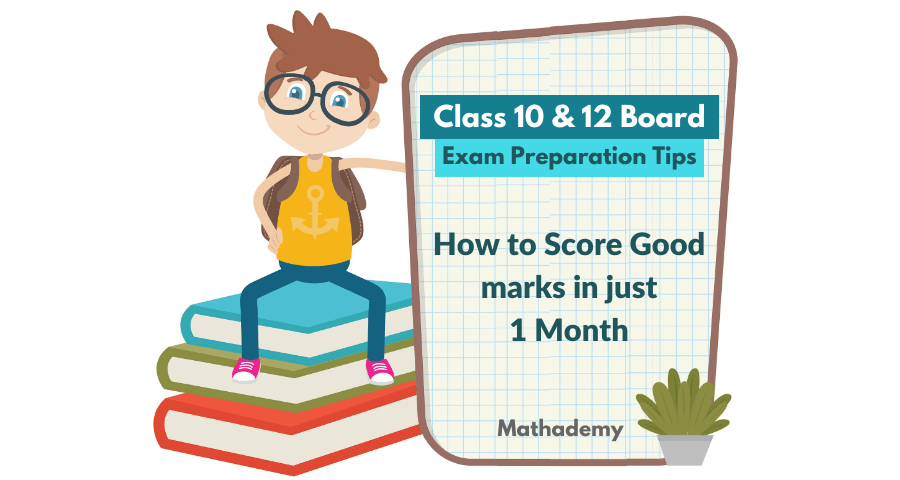How to Score Good marks in Board Exams with just one month of preparation

10th and 12th board exams are soon approaching and the last few months are the most crucial ones for your preparation. It anyway isn’t easy to prepare for an exam that is touted as one of the biggest exam of your life. As a youngster, board exams are probably the first challenge you will face among the many other challenges that you will face later in life.
But the good part is, You can easily score 90+ even with just one month of preparation. And, you just have enough time to be prepared.
With little over a month left for the exam, here are some useful tips that can help you prepare yourself for the exam in faster and better way.
Manage your time smartly:
When too little time is left, the first thing you must focus on is- time management. Your fate in the exam depends on how well you manage time. Ensure you give the required amount of time to each subject based on your proficiency and the vastness of the syllabus.
One way to plan your study could be to start preparing for exams in the reverse order, that is, prepare first for the last exam such that you start preparing for the first exam about 1 week before the date.
Study textbooks thoroughly:
Building concepts without learning the basics is an unhealthy and tiresome way of studying. Textbooks provide thorough knowledge of the basics and once a student gains this knowledge of the basics, he can solve other reference books as well easily.
There is generally very little chance of a question beyond your prescribed textbooks. Ensure you are well versed with each concept and topic in your textbook. Do not ignore diagrams, tables or graphs as questions can be asked from any section.
Take regular breaks:
The optimal period of continuous study is 2 hours. Each period of 2 hours can again be broken down into intervals of 1 hour followed by 10 minutes of break. When you are on 'break', you should keep your mind free from any exam related thoughts or stress. If you use the break time to discuss the syllabus with friends or plan your next round of studying, then your mind is not on a break. If your mind doesn't take a break, the next round of studying is not going to be as effective.
Shift between different subjects:
No one likes studying maths for 6 straight hours. Give yourself a mix of subjects each day so that you decrease your chances of losing interest really quickly.
Do not have all easy subjects/topics in a day or do not over burden yourself with topics that you find difficult. To maximize your result, start your day with a easy subject/topic for an hour or so, once you get warmed up, take up a difficult subject or a topic.
Solve past year's question papers:
Try to solve at least 5 past year's question papers to get an idea of the exam pattern and popular questions. Solving previous year question papers will boost your confidence. You will also be able to understand the kind of questions to be expected in the exam and prepare accordingly. Try to finish solving during the allotted time as mentioned on the question paper to check your speed as required in the final Board Examination.
Sleep well to boost memory:
Most students stay up late till night to finish revising before exams. You need to remember that it is proper sleep that turns your short term memory(what you just studied), to long term memory(what you can recall sitting in the exam hall). So, sleep 7-8 hours every night to make sure all of your day's studying is actually retained by your brain.
Drink a glass of hot milk before going to bed in case you are facing trouble getting sound sleep.
Explain what you have learned:
One quick test that can tell you how much you have learned is trying to explain the concepts of a topic to someone who doesn't know it yet. It could be your sibling, parent, grandparent or for that matter anyone who is ready to listen to you patiently. The moment you face trouble trying to explain a certain concept in common man's terms, you will understand that you probably need another revision.
Free Practice Test
Night before and the day of the exam:
The night before the exam is very much crucial for your exam and your exam's performance pretty much depends upon that. Too much cramming, minutes before, can send your brain into a spin. You should ideally just take review for each topic you feel important or less confident.
Close your book 1/2 hour before the exam starts and feel relaxed and worry free and full of self-confidence before the exam.
The last but not the least important one is to have fun. There is still enough time to improve your performance and score better marks.
Study your syllabus, prepare well and give your papers in a cool state of mind. Examinations are just to test your understanding of subject and not to scare you.
So, keep aside the stress, Believe in yourself and get down to work!
All the best!


0 Comments